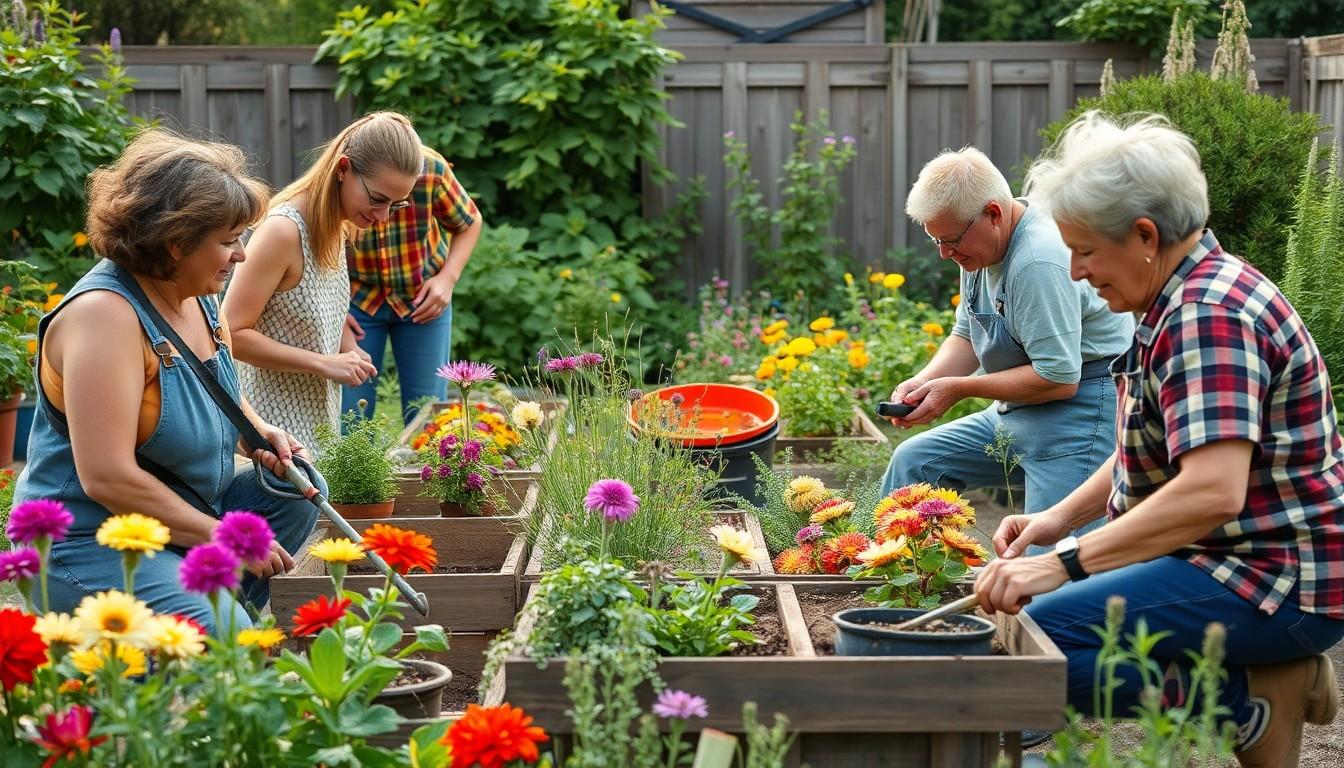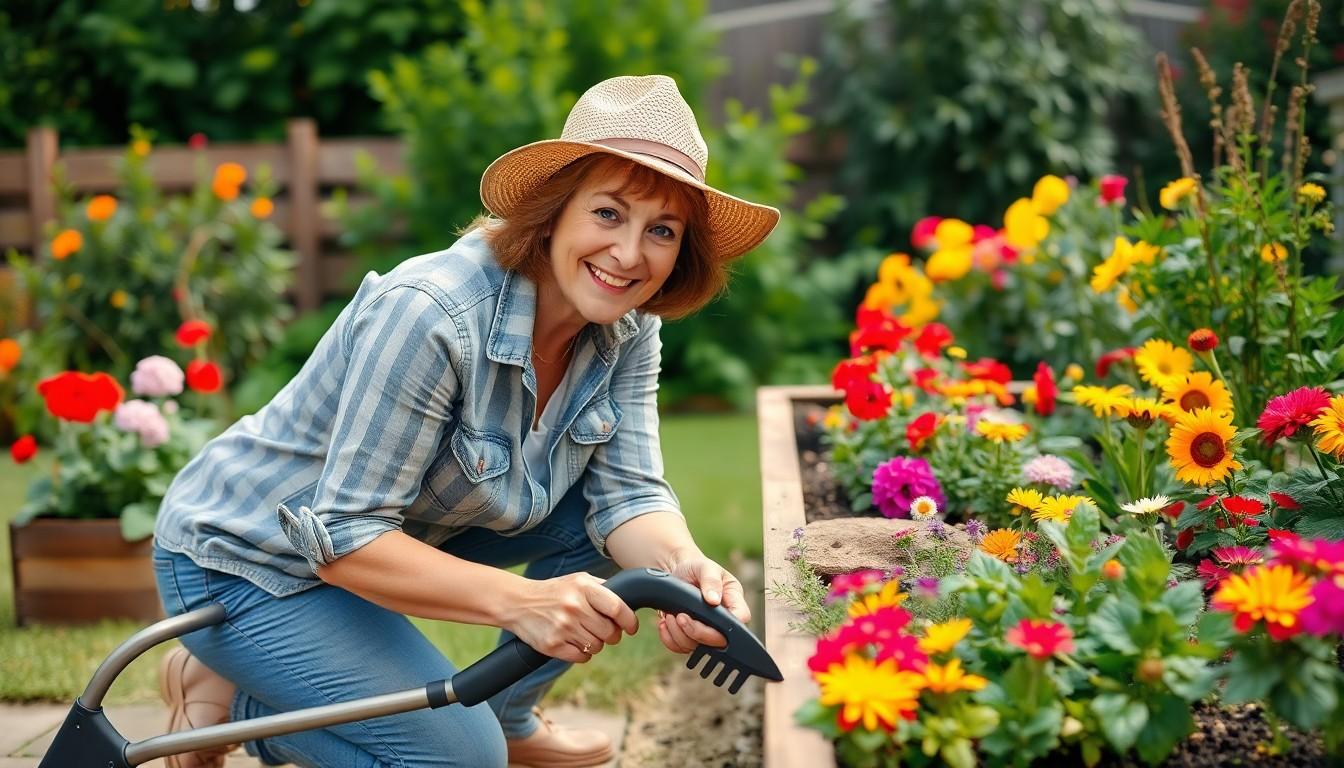Gardening should be a joy, not a chore. But for those with limited mobility or strength, it can feel more like a wrestling match with a stubborn weed. Enter adaptive gardening tools—the superheroes of the garden world. These innovative gadgets are designed to make gardening accessible for everyone, whether you’re a seasoned pro or a weekend warrior.
Adaptive Gardening Tools
Adaptive gardening tools enhance gardening experiences for those with limited mobility or strength. These tools simplify tasks while ensuring that everyone can enjoy the gardening process.
Definition and Purpose
Adaptive gardening tools refer to specialized equipment designed to assist individuals with physical limitations. These tools include ergonomic handles, lightweight materials, and adjustable features for increased ease of use. Their primary purpose focuses on promoting independence in gardening activities. By minimizing strain and optimizing comfort, adaptive tools make gardening an achievable goal.
Importance for Gardeners with Disabilities
Adaptive gardening tools significantly impact gardeners with disabilities. They offer solutions that reduce pain and fatigue during gardening tasks. Improved accessibility promotes confidence and enjoyment in gardening activities. Features such as raised beds and long-handled tools allow individuals with back or knee issues to garden comfortably. Such modifications support diverse gardening abilities, ensuring inclusivity in this relaxing hobby. Adapted tools empower gardeners to engage creatively with their gardens, fostering a sense of accomplishment.
Types of Adaptive Gardening Tools
Adaptive gardening tools come in various forms, each designed to meet specific needs for individuals with limited mobility or strength. These tools enhance the gardening experience by providing options that promote comfort and ease.
Ergonomic Tools
Ergonomic tools feature designs that prioritize user comfort and efficiency, reducing strain during gardening tasks. Handles with soft grips prevent slipping and help alleviate pressure on hands. Many ergonomic tools include long handles that eliminate the need for bending over, which is beneficial for those with back or knee issues. These tools promote a more comfortable gardening experience and can significantly reduce fatigue while working in the garden.
Raised Garden Beds
Raised garden beds provide an excellent solution for individuals who find traditional garden setups challenging. By elevating the planting area, these beds minimize the need for bending or kneeling. Heights can vary, accommodating wheelchairs or standing gardeners. Constructed from various materials, they allow for customization in size and shape. The accessible design enables easier maintenance, fostering a more inclusive gardening environment for everyone.
Garden Kneelers and Seats
Garden kneelers and seats offer versatile options for individuals who require support while gardening. Many models allow users to kneel comfortably by providing padding, which reduces pressure on knees. Additionally, they often convert into seats, providing a place to rest when needed. This dual functionality is particularly beneficial for longer gardening sessions. Foldable designs make them easy to store and transport, ensuring convenience as gardeners move around their yard or garden space.
Benefits of Adaptive Gardening Tools
Adaptive gardening tools significantly enhance the gardening experience for individuals with mobility or strength limitations. They address common challenges, allowing for a more enjoyable and fulfilling gardening activity.
Enhanced Comfort and Accessibility
Comfort increases with tools designed for ergonomic use, such as soft grips that reduce strain. Accessibility improves thanks to raised garden beds that allow users to engage without excessive bending or kneeling. Long-handled tools further aid those with back or knee issues, promoting easier maneuverability. Adjustable components ensure a tailored fit, accommodating various user heights and preferences. These features create a supportive gardening environment, making it easier for individuals to pursue their interests without discomfort. Such innovations contribute to a positive and enjoyable gardening journey.
Improved Gardening Experience
The gardening experience transforms with adaptive tools that simplify tasks and promote independence. Tools that minimize fatigue enhance the overall enjoyment of gardening. User-friendly designs make it possible to engage in activities like planting, weeding, and harvesting with less effort. Additionally, features like kneelers that convert into seats provide flexibility during longer gardening sessions. Increased confidence comes from successfully managing tasks without pain or exhaustion. Such benefits foster creativity in gardens while ensuring inclusivity, allowing everyone to participate and enjoy this rewarding hobby.
Choosing the Right Adaptive Gardening Tools
Selecting appropriate adaptive gardening tools involves evaluating specific needs and preferences. Each tool must cater to the user’s unique requirements for comfort and usability.
Factors to Consider
Comfort plays a vital role in selecting tools. Ergonomic designs reduce strain, while lightweight materials enable ease of use. Height adjustments ensure proper posture, preventing discomfort during extended gardening sessions. Grip type also matters; soft, textured handles enhance control and minimize fatigue. Furthermore, consider the specific gardening tasks; tools for weeding differ significantly from those for planting. An assessment of individual mobility limitations can lead to better tool choices. Lastly, a budget overview can help identify tools that balance affordability with effectiveness.
Recommendations for Specific Needs
For individuals with limited mobility, long-handled tools provide essential reach without bending. Users managing back pain benefit from raised garden beds, reducing strain while planting. Kneelers featuring sturdy support serve multi-purposes, functioning as both seating and kneeling pads for comfort. Garden rakes and trowels with ergonomic features ensure ease of use for those with grip challenges. Those needing assistance can choose modular tools that adapt to various gardening tasks. By evaluating needs, gardeners can select effective tools enhancing their creative experiences in outdoor spaces.
Adaptive gardening tools play a vital role in making gardening accessible and enjoyable for everyone. By addressing the unique needs of individuals with limited mobility or strength, these tools empower users to engage fully in their gardening activities.
With features designed for comfort and efficiency, they transform the gardening experience into a fulfilling hobby rather than a chore. As more gardeners discover the benefits of these innovative solutions, the gardening community becomes increasingly inclusive, fostering creativity and connection to nature.
Investing in adaptive tools not only enhances personal enjoyment but also encourages a lifelong passion for gardening.


